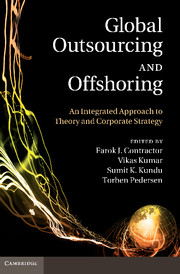Book contents
- Frontmatter
- Contents
- List of figures
- List of tables
- List of boxes
- Notes on contributors
- Preface: the reconfiguration of the world economy
- Part I Conceptual frameworks and theories
- Part II The offshoring and outsourcing of R&D and innovative activities
- Part III Management issues in offshoring and virtual teamwork
- Part IV Empirical analyses and case studies of outsourcing and offshoring
- 12 Offshoring of high-value functions
- 13 Offshoring of IT and business, professional, and technical services
- 14 Outsourcing human resource activities
- 15 Managing core outsourcing to address fast market growth
- 16 Imitative offshoring strategies
- Index
- References
13 - Offshoring of IT and business, professional, and technical services
The recent experience of the United States
Published online by Cambridge University Press: 10 January 2011
- Frontmatter
- Contents
- List of figures
- List of tables
- List of boxes
- Notes on contributors
- Preface: the reconfiguration of the world economy
- Part I Conceptual frameworks and theories
- Part II The offshoring and outsourcing of R&D and innovative activities
- Part III Management issues in offshoring and virtual teamwork
- Part IV Empirical analyses and case studies of outsourcing and offshoring
- 12 Offshoring of high-value functions
- 13 Offshoring of IT and business, professional, and technical services
- 14 Outsourcing human resource activities
- 15 Managing core outsourcing to address fast market growth
- 16 Imitative offshoring strategies
- Index
- References
Summary
Introduction
The virtualization of work has increased the opportunities for global organizational collaboration several fold. Organizations today rely on supply chains that criss-cross the globe in the creation of both manufactured goods and services. Several large emerging countries such as China, India, and Russia, have embraced open trade and investment policies adding billions of workers to the global talent pool with implications for employment in both developed and developing nations. Global outsourcing and offshoring have exploded, enabled by new technologies in information processing, communication, and transportation. As Blinder (1988) noted, it is important to consider the dynamics of employment resulting from changes in international trade policies. For just as in the 1980s, when blue-collar workers began to see jobs shift to locations in Mexico and South Korea, today, white-collar service jobs are moving to countries like the Philippines and Poland. Moreover, changes in trade policies do not have the same effect on all occupations and sectors (Cohen and Zaidi, 2002). Some view these changes in the labor market as more harmful to national economies than manufacturing offshoring, because of the high-value jobs involved.
This chapter examines business, professional, and technical service (BPTS) and information technology (IT) service exports to the United States from a group of twenty-nine countries in a search for the country-level determinants of trade in these high value-added services.
Information
- Type
- Chapter
- Information
- Global Outsourcing and OffshoringAn Integrated Approach to Theory and Corporate Strategy, pp. 355 - 377Publisher: Cambridge University PressPrint publication year: 2010
